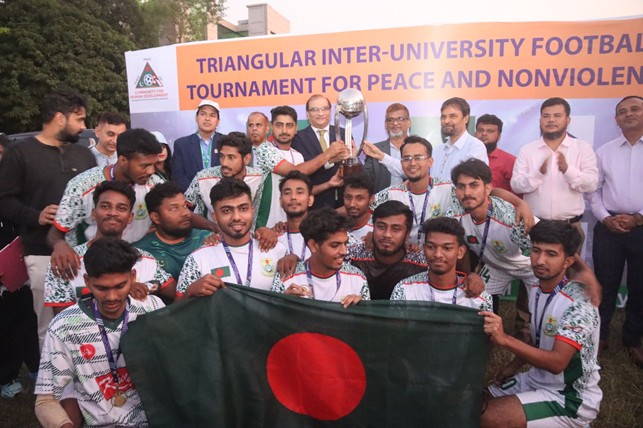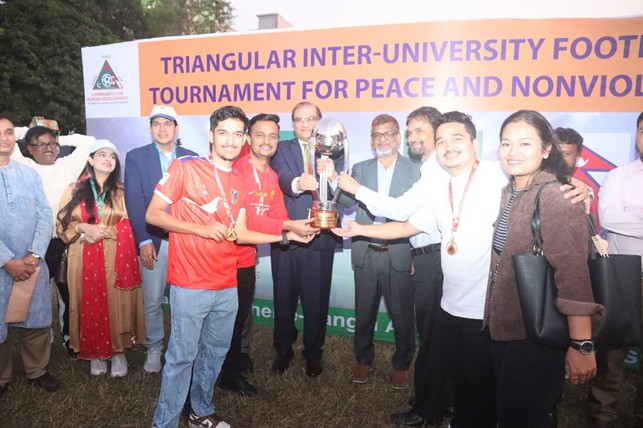The Triangular Inter-Universities Peace and Non-Violence Football Tournament marked a defining moment in South Asian youth diplomacy.
Played between Pakistan and Bangladesh at the vibrant football ground of Sher-e-Bangla Agricultural University, Dhaka, the final match attracted an extraordinary crowd. Students filled the stands, faculty members gathered in excitement and spectators lined the sidelines in anticipation of a historic contest between two nations whose shared past is both emotional and complex.
The match itself was intense and thrilling. Both teams played with determination, discipline, and passion—reflecting not only their athletic commitment but also their role as ambassadors of goodwill. After a fiercely contested game, Pakistan secured victory by a single, decisive goal, winning the championship in front of an audience whose cheers reverberated across the campus. It was more than a win; it was a moment that symbolized resilience, unity, and renewed friendship across borders.

The ceremony that followed added further depth to the event. The Chief Guest, H.E. Imran Haider, Pakistan’s High Commissioner to Bangladesh, graced the occasion along with the Vice Chancellor of Sher-e-Bangla Agricultural University. Their presence underscored the diplomatic significance of youth-led sports initiatives in fostering regional harmony. Trophies, medals, souvenirs, and shields were awarded to the three participating teams—Pakistan, Bangladesh, and Nepal—as well as to distinguished guests, organizers, and outstanding individual players.

Yet, the importance of this tournament went far beyond medals or match results. It represented the fulfillment of a long-standing humanist dream: the aspiration to bring together the youth of South Asia—especially from Pakistan, Bangladesh, and Nepal—through the unifying power of football. By competing, collaborating, and living together, these young players began reshaping the narratives shaped by politics, history, and distance. They saw one another not as strangers or rivals, but as friends, teammates, and fellow human beings.
Throughout the event, countless small but meaningful developments emerged. Students interacted across cultures, shared stories, exchanged ideas, and discovered a sense of mutual respect that textbooks alone could never cultivate. Organizers, volunteers, and faculty members worked together with sincerity, demonstrating how youth leadership and cross-cultural teamwork can create environments of trust and cooperation. For many, it was their first time engaging closely with peers from neighboring countries—an experience that opened hearts, broadened perspectives, and dismantled misconceptions.
This final match was thus not just the conclusion of a tournament, but the beginning of a new chapter in South Asian peace-building. On the football field of Sher-e-Bangla Agricultural University, a new generation of South Asians witnessed the possibility of a future shaped not by conflict or division, but by empathy, respect, and shared dreams.
As the sun set over the campus and the teams walked off the field—Pakistan with victory, Bangladesh with pride, and Nepal with dignity—the message was unmistakably clear: football had succeeded where politics often struggles. It built bridges, healed distances, and reminded everyone that the youth of South Asia hold the power to transform the region’s story—not through violence or distrust, but through sport, friendship, and humanity.